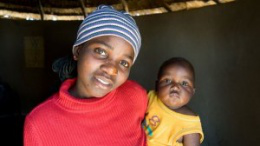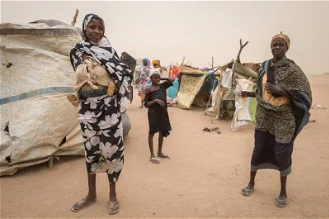Zimbabwe blog: resilience after decade of devastating decline

Beauty Moyo, 19, with her son Thamsanqu -supported by CAFOD
There is a lot to say about Zimbabwe. After many years of decline - the collapse, really, of both the economy and the health care sector - I've been happy to see some level or normality return to the country.
When I was last here in 2007, the shelves of the stores were literally empty, and inflation was driving the Zim dollar into trillion dollar figures to buy even basic commodities.
With the change over earlier this year to foreign currencies, food is again on the shelves as merchants can actually purchase food and make a profit on its sale.
People I've been speaking with here are more optimistic then I have heard them in several years on my trips through. But the crisis is Zimbabwe is still very real for millions - in fact for most of the country's population of 11 million people.
That is most particularly evident in the rural areas where Caritas is reaching out to the most vulnerable - more than 164,000 people - with the current emergency appeal.
I met many of them this week - HIV sufferers, children abandoned by parents searching for a better life in neighbouring countries, and the elderly, like those people I met at a Caritas-supported old age home in Masvingo.
Among those being helped as well are hospital patients. Perhaps nowhere has the economic collapse been more devastating than in the national health care system.
Patients were quite literally expected to bring all they needed for treatment to the hospital with them, as the money to supply drugs, rubber gloves, and even food for patients simply was not there.
We spent the dayat the Ndanga District Hospital, a 170-bed facility that, like many rural health care centres, has found itself on the front line of the nation's health care crisis.
Common ailments in rural areas like respiratory tract infections, hypertension, skin diseases and others have increased in recent years as the poor have simply not been able to access sufficient health care.
Fortunately for Ndanga and its patients, Caritas is now providing the facility with both food and some basic medications, allowing the hospital to buy other food supplies and much-needed medicines to better treat its patients.
After perhaps a decade now of devastating decline, things now are at least stable. But the rural poor have yet to feel that stability.
Hunger is still common, illnesses easily treated are still killing people for lack of access to proper health care. And many need more than they have, just to survive.
But if there is one thing the people of Zimbabwe have in ample supply, it is resilience. And that, combined with help from Caritas and others, may just be enough to get them through.
Caritas worker David Snyder is currently visiting Zimbabwe.
To support CAFOD's Zimbabwe Appeal see: www.cafod.org.uk/giving/emergency-appeals/zimbabwe





















